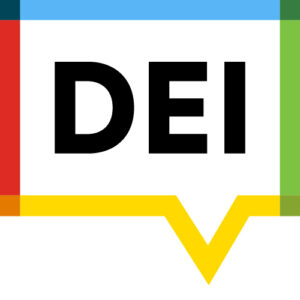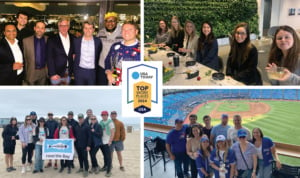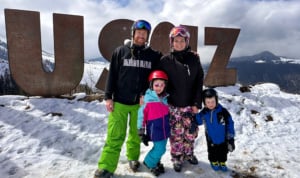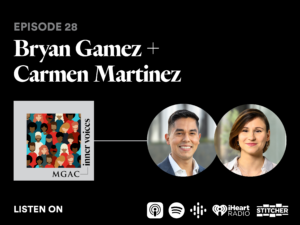MGAC Inner Voices: Episode 2
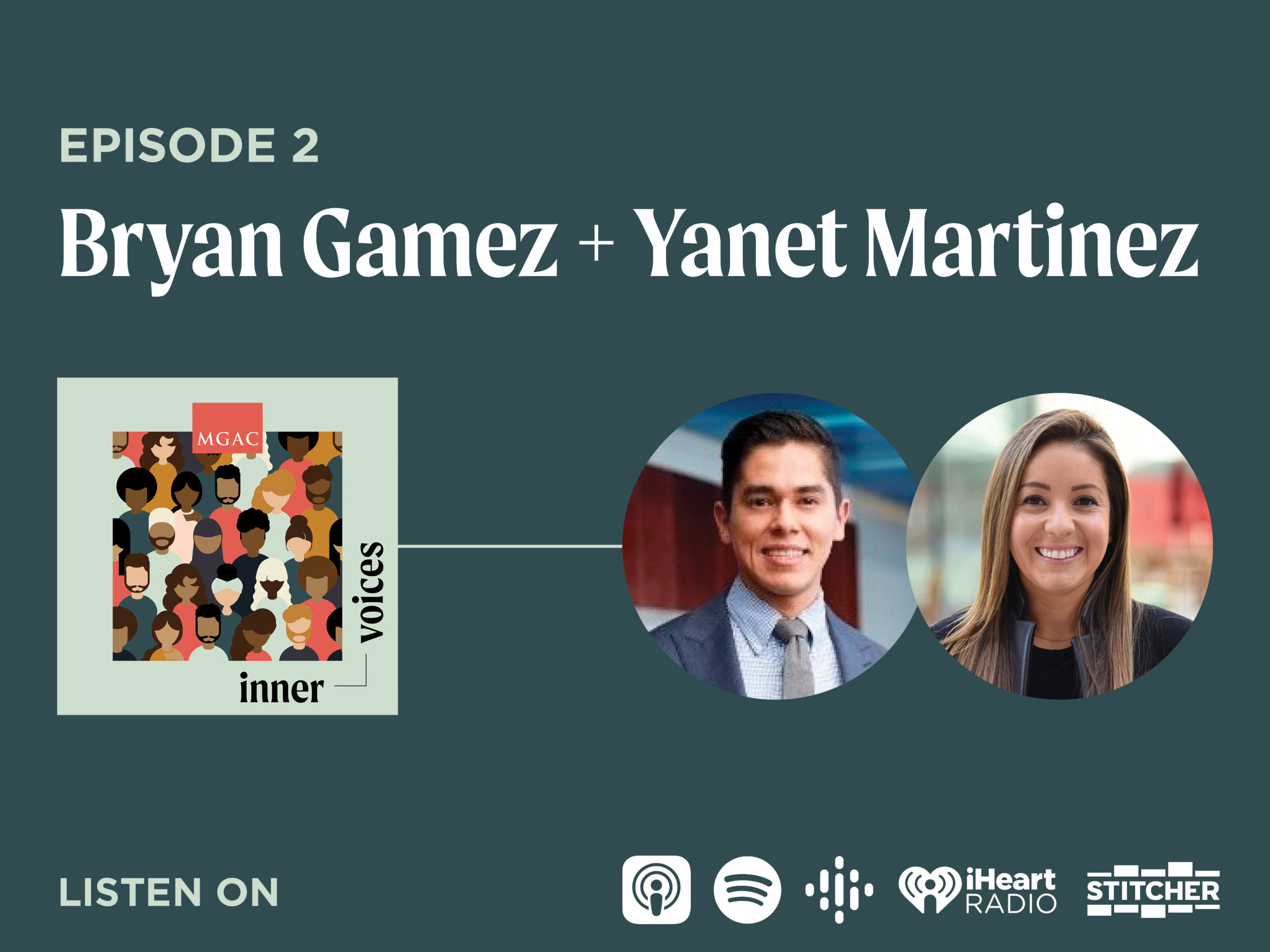
MGAC Inner Voices is an interview format podcast where a diverse mix of employees are interviewed to share their perspective on challenges they have faced in the A/E/C industry as a result of their identity—including race, ethnicity, religion, age, gender, sexuality, ability, etc. By discussing the experiences of our staff, our hope is that their stories will have newfound and powerful resonance with the audience—both to comfort others in similar situations and to encourage those in positions of power to bring about positive, actionable changes to workplace environments for all A/E/C professionals, regardless of their identity.
Bryan Gamez (MGAC Assistant Project Manager, Los Angeles) talks with Yanet Martinez (MGAC Assistant Project Manager, Los Angeles) about cultural adaptation, how one’s upbringing can influence work ethic, and the importance of mindfulness and communication.
View Transcript
Transcript
Bryan: Hi, and welcome to another episode of "MGAC Inner Voices," a podcast digging into issues of diversity, equity, and inclusion in the architecture, engineering, construction industry. We want to preface this podcast by letting our listeners know that we are not experts in all things diversity, equity, and inclusion. We want to share our stories and discuss how together we can create better outcomes for all of us in the AEC industry and beyond. Without further ado, I'm Bryan Gamez, your podcast host. I am a project manager at MGAC working and living in Los Angeles, California. And today, we have the honor of speaking with my dear friend, Yanet Martinez.
Yanet: Hi, Bryan. I'm excited to be here today. I'm Yanet Martinez and I am an assistant project manager with MGAC at the Los Angeles office. I've been with MGAC for a little over a year and a half. My educational background is in landscape architecture. I am a licensed landscape architect, and I worked in that field for a couple years before I went on to work at a museum where I did both landscape and project management for capital projects before joining MGAC. I have been in the industry for over 12 years now.
Bryan: Well, I'm so happy to have you with us today, Yanet, I hope that we can have a great conversation. And I would like our listeners to know, what group do you identify with?
Yanet: I am a Latina woman in construction.
Bryan: And how would you say your identity has affected you in the professional space? Have there have been challenges that you have faced because you're a Latina woman?
Yanet: Yes, I think definitely being a woman has had its challenges. And being a Latina woman has probably added to those challenges in some sense or another in this industry that's primarily dominated by men.
Bryan: Are there any specific examples of any challenges that you have faced?
Yanet: Well, I think it's kind of interesting. You know, some of the challenges that come to mind have to do with people taking direction from me when I was in a supervisory role. You know, it's a little difficult sometimes to pinpoint exactly what it is. Is it because I'm a woman? Is it because I am a Latina woman? And in some instances, the question of age comes to mind. And I'm sure you might have the age as part of an experience. But you know, there have been instances on-site in having to provide crews with direction, which are primarily composed of men, that they have difficulty accepting direction from someone of my description to the point where I've had men yelling at me, or downplaying my professional experience, even as a client.
Bryan: Absolutely. What you have said has even happened to me. As a gay, Latino, and my age, I'm approaching 30. So being on the client-side, I have felt that I've had to face these challenges with men taking direction from us. And I think we have to be confident in ourselves and in our backgrounds to say, "You know what, this is who I am as a person, and this is what we're going to do." There are times where I've had to adapt to the workplace. Have you ever had to adapt who you are as a person in the workplace? And what motivated that and how did it affect you personally?
Yanet: I'd say yes, I've definitely had to adapt who I am culturally. But I think that it almost even begins beyond the workplace. And I understand that you know, the focus of this podcast is the workplace. But I think it's also important to talk about how people may have to adapt in other environments. For me, one of those instances was where I first experienced cultural adaptation first hit when I was in college. And for me, you know, growing up as a Latina first-generation, I guess I grew up in a community here in Carson in LA County, where I went to school with a very diverse demographic. But that was primarily consistent of, you know, Latino, black, and Filipino, and Samoan. And for me, I think my first kind of adaptation really was when I went to college and had to adapt to a culture that was more white. And, you know, I don't say that as a bad thing. But I think it presented to me challenges that perhaps other individuals going through the college experience didn't necessarily have to go through. And I know I'm kind of taking it a step back here. But I think it's important to talk about these things because oftentimes, even before you enter the workplace, individuals especially in certain minority groups, are faced with these challenges. And it's not that just that you're learning a career or profession, but you're learning how to socialize and interact with a culture that you're gonna have to adapt to once you enter the workplace, right?
Bryan: You're absolutely right, Yanet. You know, this may be a conversation about the workplace, but the conversation doesn't exist in a bubble just surrounding MGAC and our clients. You're right that you know, you're talking about your experiences from secondary school to college, and now beyond how that has left a lasting impact on yourself. And it resonates with me, and I'm sure it resonates with a lot of our listeners who come from diverse background. And for myself, as a Latino and going to college first-generation, I had to adjust to this other culture I wasn't aware of. So, I understand exactly where you're coming from, Yanet.
Yanet: And I'm shaking my head “yes” because I think it's important to talk about, if it helps anybody who's just kind of starting off to share that experience and that relation of like, I get it, you know. But I think it's important because I think that adaptation does start early on and it starts before you arrive to the workplace and even when you enter your profession, you continue to adapt. I think, you know, you can grow from these adaptations, that it's also kind of good to question and ask yourself, "How can I also introduce some of my culture into the workplace?"
Bryan: Do you ever feel comfortable though, adapting your persona in the workplace, to accommodate someone else's discomfort? Has that ever been an experience that you've gone through?
Yanet: I think yes and no. Maybe my discomfort has probably been in not speaking up or saying something, you know, because of potential reaction that I might receive.
Bryan: What is the greater big picture impact of having to go through this beyond just the specific events themselves? How do you think this is going to...how does this really affect or provide a greater perspective on this situation?
Yanet: Well, I think a big part of it is acknowledging it and having discussions and conversations about it, right? Which is what we're doing right now. And I think, you know, with a lot of what we saw, for example, in 2020 with Black Lives Matter and you know, people coming forward and speaking out, I feel frankly that I have it easy because even within the Latino community, I think that you sometimes see a color of the skin of how people treat you. And I am you know, a lighter skin Latina woman and I can see how that's also provided me advantages that, you know, it might not of my friend. And so, I see that, you know, not just for myself but for others. But I think it's exposing a reality whether we want it or not about a culture and creating these discussions. I think what we do with it now is what's gonna matter. And I think, you know, not just talking about it and saying, "Yes, I have the intention of doing something," but actually taking action and taking the steps to create a better culture.
Bryan: Right. And I think this is going to empower others to speak up, it's gonna provide greater visibility in the AEC industry as a whole. Of the lasting impacts that this treatment has had, I agree with you. I'm also a lighter-skinned Latino, and I had a brother and he was darker skinned, and people would treat us differently. And I just think that it's unfair that my skin color could have provided me an advantage that wasn't provided to my brother. And so, I understand greatly what you're saying. And the first step is having the conversation, right, Yanet?
Yanet: Exactly.
Bryan: Why do you think diversity, equity, and inclusion is important in the workplace, and what value does it add?
Yanet: I think it's super important. I think it brings different views and perspectives that you may not have otherwise had if you just limit it to one group. And I think by that not only are you creating a better workplace, a better company, but a better community.
Bryan: Absolutely, Yanet. How do you think your unique identity makes you a strong asset for the team? Here at MGAC, I know that when the office was open, we sat right next to each other. So, I know why you're a strong asset, but I hope that you can tell our listeners why you think you are?
Yanet: I know. I miss sitting next to you, Bryan. I can't wait to be back in the office.
Brayn: Yes.
Yanet: I really can't. I think everybody's experiences are different. And I think for me, my experience, my upbringing are a huge part of who I am and the principles that I carry into my work. I grew up working at my family's business from a very young age. And, you know, I carry those values with me in every project that I work on. That's an experience that, you know, I think it's very important to me, and I also feel like is a huge part for a lot of minority groups. You see a lot of minority groups having small businesses and being entrepreneurs. For some, their experience may be weighed heavier on education, but others might be work experiences. And not dismissing anybody's experience or background, no matter how different from your own, because what they bring to the table may surprise you.
Bryan: You speak about growing up with strong values and a business. Can you speak more about that?
Yanet: I think this has been you know, both maybe a blessing and a curse in a way. I worked with my family at a nursery. It was school and work. That was kind of the routine. And I think, again, I think a lot of my values that I bring to projects or to clients is that you treat that as your own and your success is the company's success. And I think that that is a blessing. And I think that's something that I would have...I don't know where else I could have learned that. I think it's something that you do from being part of a group and understanding that you're part of a team.
I think one of the things too, and it has to do I think maybe with the Latino culture, I'm sure it applies to many others, but you know, growing up, you work hard, you know, and I think that has benefited me tremendously. You work hard and to some degree, you don't complain. But in certain instances, you have to for your own self realize like how can I take these lessons and evolve them? And I think that for me, it's like yes, you do work hard. You know, you're going to come into situations and challenges where you do need to speak up and you do need to say, "Hey, this isn't right," and understand that maybe things that in your culture may be frowned upon may actually be required in a different setting, you know.
Bryan: And I think it's important to always remain confident in who you are and your background because it informs who you are as an individual and you shouldn't allow others to make that decision for you.
Yanet: Absolutely.
Bryan: So, I want to move into our industry as a whole. As project managers in the AEC industry, part of our job is to help advise clients when developing project teams, you know, creating a more equitable space. What are some ways that we can impact change through our work?
Yanet: Good leadership is always important as well as just mindfulness and communication. And I mean this with not just the project team but understanding the stakeholders and the end-users in the community and how is the project impacting those aspects of a bigger picture.
Bryan: What measures can our colleagues take when clients seem uncomfortable with diversity, Yanet? What's your opinion?
Yanet: I think, you know, like many things, it's just listening and communicating.
Bryan: Agreed. I think listening and communicating is one of the most effective tools in our tool chest. When it comes to clients who are uncomfortable with diversity, do you think that we should engage with them and tell them, you know, this is a moment in time where diversity is really crucial in our industry, and we should incorporate more of it due to the perspectives that other people can provide?
Yanet: Yeah, I think it's a tough question because you know, I think everyone has their process and how they're going to accept diversity. But I think that we can maybe help. And this goes for everybody, you know, it could be your neighbor or friend, not even specifically a client but just by providing positives for why diversity is so important and allowing them the time to process it. But I think we also need to understand that everybody is going to process things differently and at different times. So, from our perspective allowing people to go through that process, and it's not always going to be overnight.
Bryan: Right. What advice would you give to young people pursuing AEC careers that think they might face discrimination in the workplace?
Yanet: I think that despite my challenges, I've been super blessed and surprised at how many people rooted for me. I think that at the end of it the good always outweighs the bad. And staying positive that yes, challenges are always going to be presented in some form or another, but I think you see them as opportunities for growth.
Bryan: You rise above them.
Yanet: Yeah. It might be growth for yourself, or it might be an opportunity for you and that person that might be presenting the challenge to also grow.
Bryan: A learning opportunity for everyone. That's a great point. How would you like to normalize the conversation of diversity in the workplace? Do you think we need to normalize it?
Yanet: I think you just do it. I think you just start talking about it, you know?
Bryan: You begin the conversation by doing exactly what we're doing, we have created this forum for us to publicly speak about it and I hope to see that within other companies as well. And also give other people the opportunity to be more courageous to speak up because when you have more courage you are able to have more meaningful conversations about diversity and what that means to others. It also allows...I touched upon this previously about vulnerability, being vulnerable, allowing people to come in and listen to your stories, I think that is going to normalize diversity in the workplace. Do you think that's the best approach? What do you think your approach would be?
Yanet: I 100% agree with you. I think oftentimes and you know, speaking from my experience you know, I am of the thinking where it's like, "Oh, I don't want to bother someone with my experience or my story or something like that." I think I was kind of nervous just even doing this. I'm like, I don't know that my story is relevant, you know, but...
Bryan: Your story is 100% relevant, Yanet. I want you to know that.
Yanet: And that's the thing though. I think that people are going to surprise you. And I think that goes back to, you know, what I said, there are more people rooting for you than not. And people want to hear those stories. I'll tell you this, I remember at my last job having project meetings, and I was on the client end at that point. And I'd be sitting in a meeting with 30 people, architects, engineers, contractors, you name it. And out of that room, there were probably four women, you know, and it kind of went to show you again, that imbalance in the diversity. But the thing is that a lot of the people in that room were supportive. They wanted to see more diversity and wanted to hear your stories. I think you'd be surprised when you share your story that people are interested in learning more.
Bryan: That's why your story is so relevant. You talk about you being one of four women in that room. You have that voice, Yanet, and it's a powerful tool, and I hope you continue to use it. What do you think our industry is going to look like in 10 years' time in 2031? Crazy to think about that.
Yanet: I hope that, again, these conversations that have been triggered by the Black Lives Matter movement, I hope that they continue to carry out and not just in words, but in actions, right? And by that I think that if we do continue as a society to step in that direction, I think we're going to just be more innovative overall in the way that we approach things. Yeah.
Bryan: Absolutely. I think having people in leadership positions who genuinely care about LGBTQ, Latinos, Latinas, black men, black women, that will create an environment that's conducive to new innovations, new ideas, and the future of the AEC industry is boundless when we harness everyone's ideas.
Yanet: Absolutely. Yeah.
Bryan: How can we bake the DEI into MGAC's DNA?
Yanet: Obviously, this podcast is a great example. Other things that MGAC has started, a book club for the staff, that's great and these calendars. It's fun, because you get to see, for example, the January one, I saw El Día de Reyes, right. And I can remember going to Mexico when I was young every winter and celebrating it and now to be like, "Yeah, oh, my God. I can see it here." But then also seeing other holidays from other cultures where I'm like, "Oh, wow. I want to go and be part of that celebration next year." Those are some great efforts that have already taken place. I think it's important that these things such as a podcast, such as the book club, it shows an initiative of actually taking those intents and making them into action.
Bryan: Right.
Yanet: You saw a lot of posts on social media, companies with intent, and I think, you know, actually seeing these companies carry out is important.
Bryan: Yeah. And to our listeners who are wondering what Yanet was referencing, our marketing team, and our HR department has created a diversity, equity, and inclusion calendar, which has dates of holidays significant to other cultures. And Yanet was talking about Three Kings Day in Mexico. And these are initiatives that MGAC is now baking into our company, to begin the conversation about other groups of people, and also providing awareness and visibility to others that we may have never even thought about before. So, I agree with you, Yanet, this is an incredible step forward. And I hope that other companies do engage in action like that because companies say they're going to do it, they're going to splash a signature with a rainbow font and say they support LGBTQ individuals or women and whatnot, but no hard action is ever taken. So, I agree with you that that's the best way we can continue to evolve the conversation.
Yanet: Yes, absolutely.
Bryan: So, if you were going to establish a company from the ground up, Yanet, how would you ensure that diversity, equity, inclusion were central to the company's ideals?
Yanet: Well, I guess it always starts from the top, right? By demonstrating it through the leadership and creating an environment of open communication. I think transparency is an important part of the company in creating a trust between the leadership and the staff.
Bryan: I know a big conversation regarding diversity is regarding tokenization. How do you increase diversity while avoiding tokenization? And I know, Yanet, that I struggled with this question when it was posed to me but I want to get your thoughts on it.
Yanet: I think it's an interesting question and I think you know this goes back to my earlier responses where I think it starts early on. One of the ways that you can do that is by early outreach and mentorship. I know for me in my experiences, one of the things that was very important to me were those internships that I had when I was in high school. You know, if I'm honest with you when I was in high school, I wasn't even thinking about going to college and some of these opportunities were very important and help define my path. I guess what I'm trying to say is that by providing early outreach and early mentorship you show that you're invested in the future versus just getting someone once they've made that achievement of completing their education and gaining a few years of experience in the field and that you're not just taking one or two people here to meet a quota, but that you're actually invested in these communities that could use these opportunities and that have potential and perhaps only need some sort of boost or mentorship to guide them in that.
And I think that when you do that you're investing in a person, but you're investing in creating a great company. I think when companies talk about increasing their diversity and they show it by doing outreach and mentorship early on it shows their commitment to the future and actually taking you know, DEI seriously. I think some great examples are you know, ACE Mentor Program and Project Destined. They start seeing that, and I think it transforms and impacts everybody that's involved.
Bryan: Absolutely. So, for any of your co-workers who may have never experienced discrimination and negative treatment because of their identity, what advice would you give for them to be an ally?
Yanet: Something that I even tell myself is just be mindful of unconscious bias because we're all guilty of it I guess to some degree and just being mindful and respectful. But I think in an instance where they might find someone that is being discriminated against or treated negatively and if that person or individual can't speak up for themselves, just be an ally, be a friend.
Bryan: It comes down to respect, right?
Yanet: Yeah.
Bryan: And also comes back to teachable moments, communicating and educating someone to ensure that everyone is respected in the workplace.
Yanet: Absolutely, yeah, exactly. I think just being respectful and if someone is treating someone that way stepping in and lending a hand.
Bryan: And with that, Yanet, you have lent a hand to other Latina women in the AEC industry today with our conversation. It's been such a pleasure to speak with you today, and I'm hoping that you had a good time with me, and I thank you so much.
Yanet: Thank you, Bryan. I had so much fun.
Bryan: And thank you to our listeners for listening to this episode of MGAC Inner Voices. Check back next month for our next episode.
